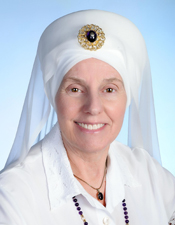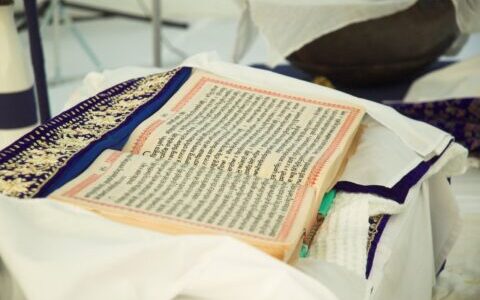Dear Ministers,
After having written my own responses to this year’s Minister renewal exam—yes, I too have to do the exam!—I read the first 60-plus responses that were received at the beginning of the renewal period. (And I look forward to reading those that have come in since.)
I am both heartened and concerned. To those who took the time to contemplate the questions, and then responded honestly and thoughtfully, I thank you. To those who barely reflected at all, I missed your meditative mind. To those who wrote reactionary, critical responses, so be it. Truly, our Ministry includes many diverse perspectives. That being said, I did find some common threads that showed up over and over again. The following anonymous reflections indicate the wide range of experiences of our fellow Ministers. There was much wisdom shared as to how we might foster healing.
Question #1: Most Ministers stated that they have been deeply affected by the polarization in our communities and in the world at large. Some who don’t live in or near a community center were less directly affected yet they still experienced some impact.
Part 1a:
- Certainly, the polarization has affected me. Seeing longtime friends being against each other and in many cases cutting off communication; and seeing what appeared to be a unified community of 40 years divide into many factions has been disappointing.
- None of us are willing to give up our beliefs; so there is a stalemate. I am turning to the Guru in these times.
- I do my best to not burn all bridges based on some areas of disagreement and look toward anything, no matter how small, that may unite us.
- The polarization has put me in a position of being a healer, not just a teacher.
- Feels sad about the community in pain and division.
- My assessment is that our current situation is a period of spiritually growing up.
- If you focus on the hurt, you will continue to suffer. If you focus on the lesson, you will continue to grow. And I go a step further: If you focus on the love, your heart will continue to be open.
- I am looking to the future for clarity, where a change of leadership to a new generation, and a clear path forward for Sikh Dharma/3HO as a community will transcend polarization. I am hopeful that forgiveness will begin to prevail at some point, and will lessen polarization and the anger and regret that prevail in many areas now.
Part 1b:
- Our Sikh community is no different from the rest of the world, where everyone and everything is being questioned and challenged. This is not going to be resolved any time soon. Kindness seems to be key. Allowing others to hold their positions, without rejecting them for it, is so important. And kindness to myself, if faced with verbal abuse, can mean leaving a situation to center myself and heal.
- I hold a compassionate view towards all perspectives.
- I find that the best way to communicate within a group is to have space for all positions, as everyone is bringing a perspective of the whole. When we discard any position, it inevitably comes back later as a backlash.
- I do have loving relationships with people who hold different views from mine. I would say that I’m continuing forward and assessing myself in the most real way possible—and having that come through in my communication approach.
- What we believe is not as important as how we act. Keeping an open mind and heart will get us through. Hopefully we can embrace the other.
- I think it would be best if people would work on moving past a judgmental stance. More reflective listening, more acknowledgment.
- Think before you speak.
- Each road taken must not and cannot commit genocide to the other or we have failed to break the cycle of fear and revenge. It’s time to heal and keep working toward peace, promoting unity. Let’s communicate the effectiveness of our own incredible technology to heal.
- I have reached out to all sides to reaffirm our common interests, in the hopes of building trust. This has worked well for me.
- The quality that seems to be missing for me is: patience. If we are patient, things will unfold for us in their own way and in their own time.
- To heal…it can only occur when discourse moves from a quest to be heard and acknowledged—to the willingness to be open and reflective. Sitting in the stillness of Shunia, sharing our love for Siri Guru Granth Sahib and Gurbani Kirtan, reading our daily Banis, helping those who are unable to help themselves, and continually striving to live to our highest potential.
Question #2: There were many similar responses to this question. Here are a few:
- The connection we have to the Divine and the need to serve.
- Fundamentally, the Ministry is about service and not position.
- Common values. Work needs to be done to bring them to consciousness but, ultimately, we share a bond of common values.
- Our common ground is love, peace, healing and service.
- I think people become Ministers for different reasons. What unites us is our guiding Guru, Guru Gobind Singh’s inspiration, and our commitment to live as Khalsa.
- We find unity in our relationship to the Guru, when we acknowledge that we are humans and want to serve humanity to make the world better, and when we chant, meditate, or sing together.
- Service in the name of God and Guru.
- Our service and our faith in Guru unite us.
- God and Guru reside in the fiber of our lives.
- Ek Ong Kar.
- As Ministers, we are all on the same team—not different teams, but the same team. We are linked by God and Guru on this path.
- I feel that all of us as Ministers hold a sacred space within our identity, that we are Ambassadors for God, and have come to planet Earth to help uplift the space and time.
- We have a shared history of commitment on this path. The stories, songs, and service are part of who we are and what we belong to.
- We are united by our faith within the Guru’s wisdom.
- We feel a deep need to call on the Guru and show up to serve, no matter what!
Question #3: The responses to this question were pretty consistent.
- I foster the connection with my soul through my daily practice and through bowing in front of the Guru.
- (I aspire for) a strong Sadhana and meditative practice; to remain in service of others; and to focus on the blessings we receive every day.
- The single practice of doing Sadhana and receiving a Hukam from Siri Guru Granth Sahib neutralizes my anxiety, clears the path for inspirations and insights, and energizes me to continue with the highest consciousness each day.
- Sometimes I’m not consciously aware of underlying emotion until I sit down to meditate or read from the Guru. This brings out the emotion and clears it, allowing me to therefore move into more love, understanding, and connection to my own soul.
- Our practice through Sadhana, which includes our conscious effort every day to tune in and tune up through all the techniques we have been given.
It is my hope and prayer that you will find these personal reflections from many of our Ministers to be helpful, informative, and inspirational.
May God and Guru ever bless you in your service.
Humbly,
SS Dr. Sat-Kaur Khalsa
Secretary of Religion
THE SECRETARY OF RELIGION
 SS Dr. Sat Kaur Khalsa has served as Secretary of Religion since 1991 and was ordained as a Sikh Dharma Minister in 1975. As Secretary of Religion, Dr. Sat Kaur oversees and is ultimately responsible for the delivery of the functions of this Office. Dr. Sat Kaur is a long-time member of the International Khalsa Council and the Khalsa Council Executive Committee. She maintains a full-time psychotherapy tele-health private practice in California and New Mexico, counseling individuals, couples, and families to support their personal and spiritual growth. She is a certified Kundalini Yoga teacher, a facilitator of White Tantric Yoga®, and a published author.
SS Dr. Sat Kaur Khalsa has served as Secretary of Religion since 1991 and was ordained as a Sikh Dharma Minister in 1975. As Secretary of Religion, Dr. Sat Kaur oversees and is ultimately responsible for the delivery of the functions of this Office. Dr. Sat Kaur is a long-time member of the International Khalsa Council and the Khalsa Council Executive Committee. She maintains a full-time psychotherapy tele-health private practice in California and New Mexico, counseling individuals, couples, and families to support their personal and spiritual growth. She is a certified Kundalini Yoga teacher, a facilitator of White Tantric Yoga®, and a published author.
Photo Credit: “Guru Granth Sahib” by J. Singh (Wikimedia Commons).


